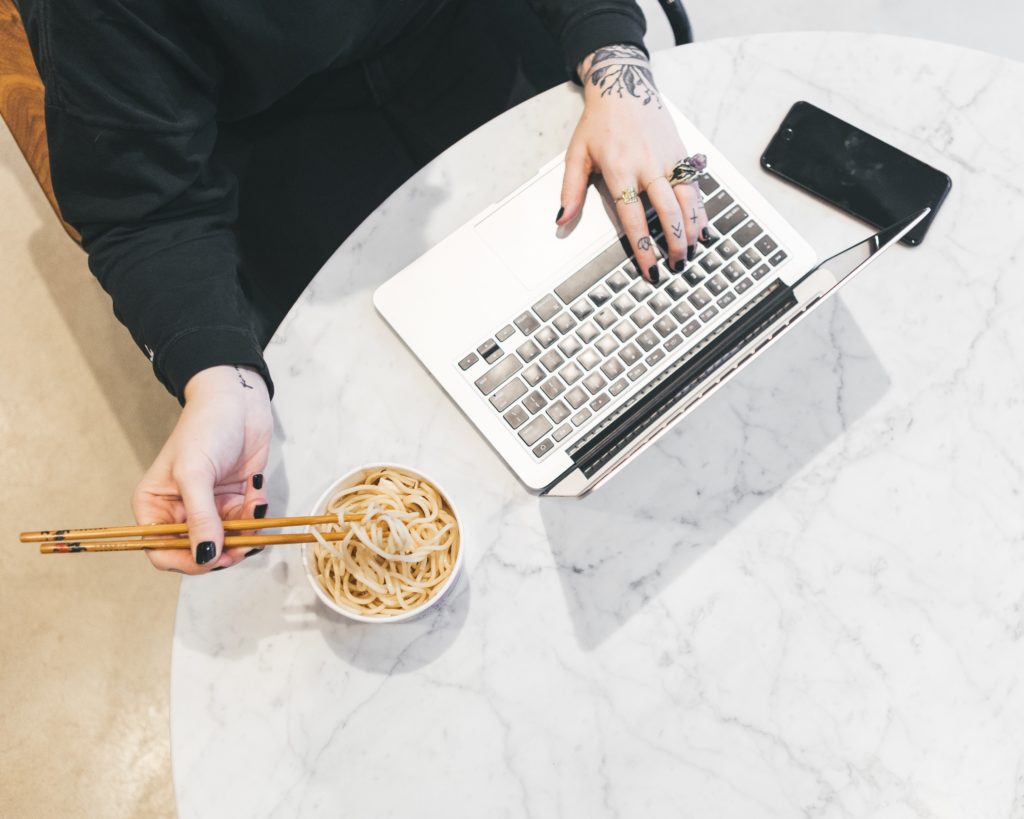While the coronavirus lockdown has changed our social life and work life, it has also affected eating habits and diets. Personally, I’ve noticed that I just can’t eat the same way as I did before. I think there is nothing wrong with it, but it still has made me feel a bit frustrated. If you’ve also experienced this, I hope the following tips will help you to handle this current situation better when it comes to preparing—and enjoying—meals.

1. Be creative in the kitchen
Before the lockdown, I used to frequently dine out at restaurants with my friends. For me, eating out was always a social activity. And now that the restaurants are closed, I really miss going out to have a nice meal.
I can say I’m still among the lucky ones because I also like to cook at home and restaurants were reserved for going out with friends. But if you used to go to restaurants daily I can understand that now you might feel strange eating at home all the time.
One thing you can do is to try to be creative in the kitchen. If you have more time now, prepare some meals that you wouldn’t normally make and try new spices and sauces. You don’t need to be perfect or even good at cooking. The process of cooking itself, away from the screens and connecting to your senses of smell, touch, sound, and taste, will have a therapeutic effect. Cooking can be a mindfulness activity that helps you focus on the present and let go of anxieties.
2. Accept that your diet might change
Let’s say for breakfast you’ve always eaten a slice of low-carb whole-wheat bread with some oil-free hummus on top. But now you can only find conventional bread and jam. Because of the lockdown, there is a high chance that you can’t always find the products you used to eat before. If you’re too strict with your diet, this lockdown can be a real challenge for you.
I think the best you can do in this case is to accept that during the quarantine your diet won’t be perfect. And it’s not because you aren’t good enough or you don’t try hard enough. So offer yourself some more self-compassion, do your best, and let go of the rest. There is really no need to strive for perfection now because it will only make you feel disappointed afterwards.
It also can have a good impact in your eating habits after the quarantine. This practice helps you to find balance be more kind to yourself and love yourself just the way you are.
3. Food safety comes before your diet
In this current situation you need to prioritize one thing over your diet: food safety. As much as possible try to avoid canned food, expired food, and highly processed food. Do your best to eat more whole foods and fresh products. If you have leftovers always keep them in the fridge and try to finish them within 3 days. These are not only good for your health but it decreases the chance that you get any illness.
When I tried to prioritize food safety it helped me to shift my mindset a bit and realize what truly matters when it comes to diets. Having a thigh gap or flat abs currently became unimportant. What I consider more significant is eating foods that make me healthy and safe.
4. Try to avoid boredom- and stress eating
The quarantine can also increase the possibility of boredom- and stress eating. Now that we stay home most of the time, we can feel bored or frustrated more often than usual. In these cases a lot of us reach for the comfort of food.
Recently I noticed that I ate a slice of chocolate just because I felt nervous or had a bag of chips because I had nothing else to do. This goes for many of us: according to studies, we are hardwired to seek hyper-palatable (ie high-sugar, high-fat) foods when under uncontrollable stress. On a neurocircuitry level, stress affects our dopamine response to shift our reward sensitivity, food preference, and seeking of hyper-palatable foods. In plain English, that means you will likely crave a piece of vegan cake or French fries far more often than you normally do. This is not the end of the world, but if it happens you too often or you feel miserable afterwards it can make self-quarantine a real struggle.
To add salt to injury, stress eating is positively associated with obesity in women but not in men. Based on anecdotal observation of male friends who claim not to ever get stress cravings, I would say that this is true.
The good news is that you can mitigate the situation by staying aware and finding alternative stress-relieving outlets. If you feel bored or anxious, try to find some activities that you enjoy doing other then eating. It was not so easy for me because I like to run or go for a walk when I need to refresh my mind. But now I needed to do something indoors. I ended up doing some yoga, painting my nails, journaling, and reading. It doesn’t really matter what you do, you should just enjoy it and shift your focus from food.
Also by Adrienn: How To Motivate Yourself To Get Dressed During The Quarantine
Related: How to Turn Eating By Yourself Into A Wellness Practice
Get more like this—Sign up for our daily inspirational newsletter for exclusive content!
__
Photo: Adrienn Gyetko; Creative Exchange via Unsplash





